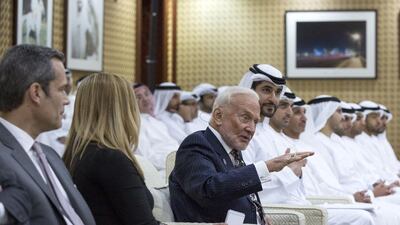So many things that happened this week made me feel as if the universe was aligning my life serendipitously, under the theme of “space: the final frontier”. Watching Disney’s Tommorowland, catching a rare glimpse of the starry sky, hearing about the launch of the UAE Space Agency and having the pleasure of attending a lecture by Buzz Aldrin – all this had me craving for an intergalactic adventure that I thought was lost along with the astronomy books I used to read as a child.
Last year, Sheikh Mohammed bin Rashid, Vice-President and Prime Minister of the UAE and Ruler of Dubai, announced that the UAE would be sending an unmanned craft to Mars by 2021, coinciding with the country’s 50th anniversary. The news did not really sink in until I sat a few feet away from Dr Aldrin and heard him explain how he, along with Neil Armstrong and Michael Collins, made it to space.
Although I never really wanted to be an astronaut, I did have a desire to somehow magically travel to outer space and gaze at our amazing universe. As a child, whenever I would get too caught up in an issue that seemed life-defining, I would try to imagine just how small our planet is and how our galaxy is simply one of many.
That would help me put my issues into perspective. I would spend hours wondering how beautiful the other planets are, how nice it would have been if I could run around the rings of Saturn and whether I would have fallen while trying to sit on Neptune if it was a giant ball of gas.
Such thoughts have now come back to mind. What I find exciting about the UAE’s space programme is the potential positive outcomes. Not only are we going to need scientists and engineers, but the possibilities for research and development are endless. So many items that we use in our daily life had initially been developed for use in space. For example, air-cushioned trainer shoes are the result of a process known as blow rubber moulding that was used to produce space helmets. Using this technology, the former Nasa engineer Frank Rudy pitched an idea for an in-trainer shock absorber to Nike. The result? Nike Air. Or consider sunglasses that are coated with diamond-like carbon. This substance was first developed to protect astronauts’ helmet visors from being scratched by space particles. Even hand-held vacuum cleaners are believed to be the outcome of space-science research.
One of the essential benefits of our Mars mission is that it will throw up new challenges for the coming generation in the field of space science and technology, a field Emiratis don’t traditionally venture into.
This project will also bring the first Arab country into the arena of space exploration, which has been traditionally dominated by the US and Russia over the past 50 years. The UAE will be one of nine countries with ambitions to explore Mars. This isn’t just a challenge for us as a nation, but a feat for humanity. By starting to explore the red planet, we can move one step closer to landing on it.
Space is not just a place to go; it represents our inspirations and dreams. We are a generation that loves to travel. We believe that careers can be fluid and life is what we make of it. While our wanderlust has helped to bridge the gap between people across the world, it is exciting to think that space can be on our horizon again, like it was for those who grew up in the 1960s.
I think in such an environment, you can dream as big as the universe. In the words of Dr Aldrin, anything is possible if you have proper education, a supportive family and a sense of adventure.
Fatima Al Shamsi is a globetrotting Emirati foodie, film buff and football fanatic

